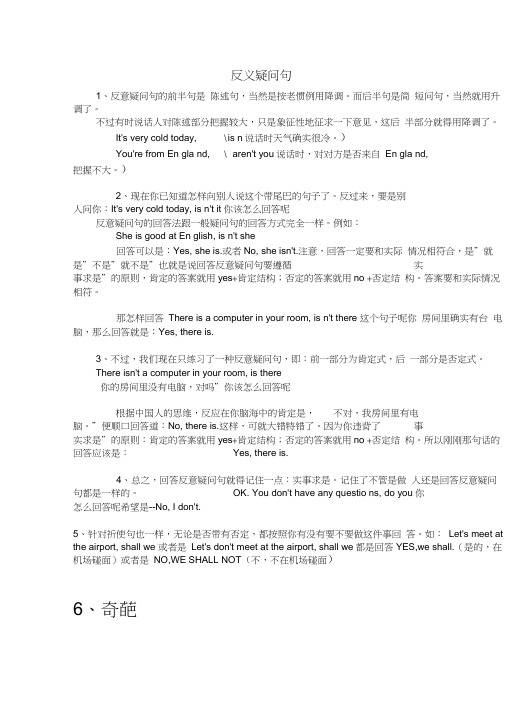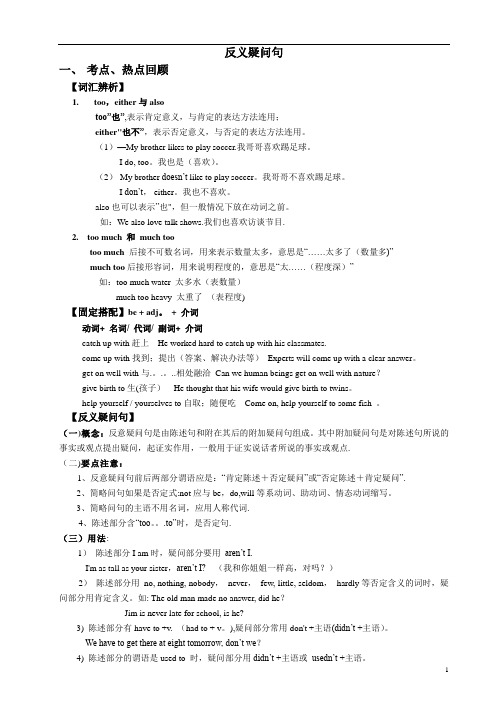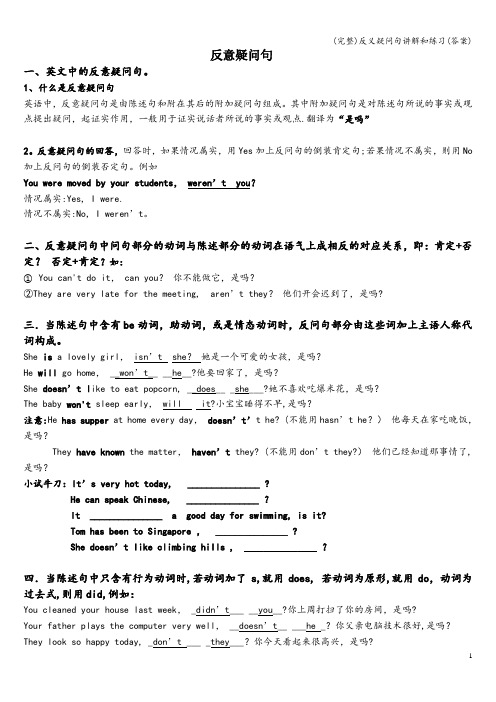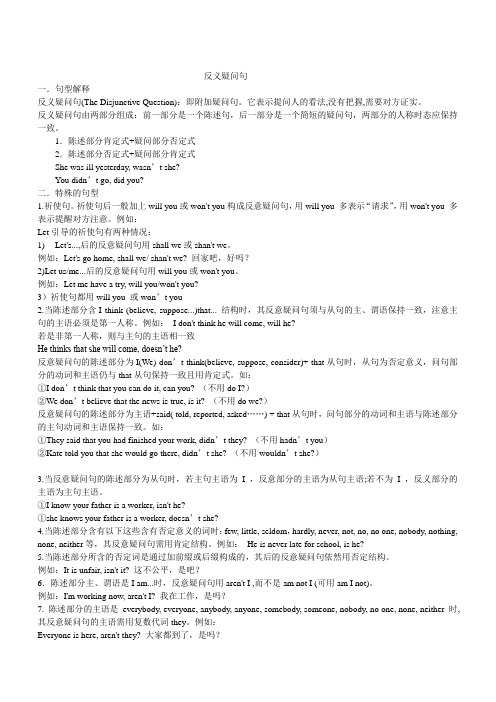反义疑问句讲解与练习
史上最全最有方法的反义疑问句讲解及练习

反义疑问句1、反意疑问句的前半句是陈述句,当然是按老惯例用降调。
而后半句是简短问句,当然就用升调了。
不过有时说话人对陈述部分把握较大,只是象征性地征求一下意见,这后半部分就得用降调了。
It's very cold today, \is n说话时天气确实很冷。
)You're from En gla nd, \ aren't you说话时,对对方是否来自En gla nd,把握不大。
)2、现在你已知道怎样向别人说这个带尾巴的句子了。
反过来,要是别人问你:It's very cold today, is n't it你该怎么回答呢反意疑问句的回答法跟一般疑问句的回答方式完全一样。
例如:She is good at En glish, is n't she回答可以是:Yes, she is.或者No, she isn't.注意,回答一定要和实际情况相符合,是”就是”不是”就不是”也就是说回答反意疑问句要遵循实事求是”的原则,肯定的答案就用yes+肯定结构;否定的答案就用no +否定结构。
答案要和实际情况相符。
那怎样回答There is a computer in your room, is n't there 这个句子呢你房间里确实有台电脑,那么回答就是:Yes, there is.3、不过,我们现在只练习了一种反意疑问句,即:前一部分为肯定式,后一部分是否定式。
There isn't a computer in your room, is there你的房间里没有电脑,对吗”你该怎么回答呢根据中国人的思维,反应在你脑海中的肯定是,不对,我房间里有电脑。
”便顺口回答道:No, there is.这样,可就大错特错了。
因为你违背了事实求是”的原则:肯定的答案就用yes+肯定结构;否定的答案就用no +否定结构。
所以刚刚那句话的回答应该是:Yes, there is.4、总之,回答反意疑问句就得记住一点:实事求是。
初中英语反义疑问句讲解-练习及答案

反义疑问句一、考点、热点回顾【词汇辨析】1.too,either与alsotoo”也”,表示肯定意义,与肯定的表达方法连用;either"也不”,表示否定意义,与否定的表达方法连用。
(1)—My brother likes to play soccer.我哥哥喜欢踢足球。
-I do, too。
我也是(喜欢)。
(2)-My brother doesn’t like to play soccer。
我哥哥不喜欢踢足球。
-I don’t, either。
我也不喜欢。
also也可以表示”也",但一般情况下放在动词之前。
如:We also love talk shows.我们也喜欢访谈节目.2. too much 和much tootoo much 后接不可数名词,用来表示数量太多,意思是“……太多了(数量多)”much too后接形容词,用来说明程度的,意思是“太……(程度深)”如:too much water 太多水(表数量)much too heavy 太重了(表程度)【固定搭配】be + adj。
+ 介词动词+ 名词/ 代词/ 副词+ 介词catch up with赶上He worked hard to catch up with his classmates.come up with找到;提出(答案、解决办法等)Experts will come up with a clear answer。
get on well with与.。
.。
..相处融洽Can we human beings get on well with nature?give birth to生(孩子)He thought that his wife would give birth to twins。
help yourself / yourselves to自取;随便吃Come on, help yourself to some fish 。
初中英语语法专题专讲--反义疑问句讲解及练习1含答案

反义疑问句【反义疑问句】(一)概念:反意疑问句是由陈述句和附在其后的附加疑问句组成。
其中附加疑问句是对陈述句所说的事实或观点提出疑问,起证实作用,一般用于证实说话者所说的事实或观点。
(二)基本用法要点注意:1、反意疑问句前后两部分谓语应是:“肯定陈述+否定疑问”或“否定陈述+肯定疑问”。
2、简略问句如果是否定式:not应与be,do,will等系动词、助动词、情态动词缩写。
3、简略问句的主语不用名词,应用人称代词。
4、陈述部分含“too...to”时,是否定句。
(三)特殊用法:1) 陈述部分是"there be"结构的,疑问部分用there。
There is something wrong with your watch, isn't there?There will not be any trouble, will there?2)must be 表示“推测”时,疑问部分用isn’t/aren’t+主语(人称代词),不可用“mustn’t”: The bag must be yours, isn’t it?You must be hungry, aren’t you?must 表示“必须”时,疑问部分用needn’t:I must finish my homework today, needn’t I?Mustn’t表示“禁止”时,疑问部分用must.You mustn’t play football in the street, must you?3) a.陈述部分有have/has/had to +v.表“不得不”时,疑问部分常用don't/doesn’t/didn’t +主语。
We have to get there at eight tomorrow, don't we?b.陈述部分have “有”时,疑问句尾可用have,也可用do:She has a new pen, hasn’t/doesn’t she?c. Have表示“吃,喝,玩,度过”等时,疑问句尾用do.They had noodles for lunch, didn’t they?d. Had better 用在陈述部分时,疑问部分用had.You had better finish your homework on time, hadn’t you?e. Have用在完成时中,疑问部分动词用have:She has gone to Beijing with her mother, hasn’t she?4) 陈述部分I am时,疑问部分要用aren't I.I'm as tall as your sister,aren't I?(我和你姐姐一样高,对吗?)5) 陈述部分用no, nothing, nobody, never, few, little, seldom, hardly等否定含义的词时,疑问部分用肯定含义。
反义疑问句讲解与练习

反义疑问句讲解与练习一、含be(is, are, was, were)动词的反意疑问句(1)句型1:主语+ be+其它,isn’t(aren’t, wasn’t, weren’t)+ 主语?句型2:主语+ be not+其它,is(are, was, were) + 主语?① You are from America, aren’t you? Yes, I am. No, I’m not.② It isn’t very cold today, is it? Yes, it is. No,it isn’t.(2)注意:There be句型例:There is an old picture on the wall, isn’t there?二、带行为动词反意疑问句(不含be和情态动词)句型1:主语+动词+其他,do/did/does + not +主语?句型2:主语+did/does/do+not +动词原形+其他,did/do/does+其他?例:You often watch TV in the evening, don’t you? Yes, I do. No, I don’t.三、含有情态动词的反意疑问句,反义疑问句中的动词使用情态动词。
例:The students must study hard, mustn’t they? Yes, they must. No, they needn’t.注意:You must go home now, needn’t you? Yes, I must. No, I needn’t.★注意:There be句型的一般将来时① There will be a basketball match tomorrow, won’t there?Yes, there will. No, there won’t.② There won’t be too much pollution in the future, will there?Yes, there will. No, there won’t.四、反义疑问句的回答:答语要和实际情况相符合,遵循“实事求是”的原则。
(完整)反义疑问句讲解和练习(答案)

反意疑问句一、英文中的反意疑问句。
1、什么是反意疑问句英语中,反意疑问句是由陈述句和附在其后的附加疑问句组成。
其中附加疑问句是对陈述句所说的事实或观点提出疑问,起证实作用,一般用于证实说话者所说的事实或观点.翻译为“是吗”2。
反意疑问句的回答,回答时,如果情况属实,用Yes加上反问句的倒装肯定句;若果情况不属实,则用No 加上反问句的倒装否定句。
例如You were moved by your students,weren’t you?情况属实:Yes, I were.情况不属实:No, I weren’t。
二、反意疑问句中问句部分的动词与陈述部分的动词在语气上成相反的对应关系,即:肯定+否定?否定+肯定?如:①You can't do it, can you?你不能做它,是吗?②They are very late for the meeting, aren’t they?他们开会迟到了,是吗?三.当陈述句中含有be动词,助动词,或是情态动词时,反问句部分由这些词加上主语人称代词构成。
She is a lovely girl,isn’t she?她是一个可爱的女孩,是吗?He will go home, __won’t__ __he__?他要回家了,是吗?She doesn’t l ike to eat popcorn, __does__ _she___?她不喜欢吃爆米花,是吗?The baby won't sleep early, will it?小宝宝睡得不早,是吗?注意:He has supper at home every day,doesn’t’t he? (不能用hasn’t he?)他每天在家吃晚饭,是吗?They have known the matter,haven’t they? (不能用don’t they?)他们已经知道那事情了,是吗?小试牛刀:It’s very hot today, _______________ ?He can speak Chinese, _______________ ?It _______________ a good day for swimming, is it?Tom has been to Singapore , _______________ ?She do esn’t like climbing hills , _______________ ?四.当陈述句中只含有行为动词时,若动词加了s,就用does, 若动词为原形,就用do,动词为过去式,则用did,例如:You cleaned your house last week, _didn’t___ __you__?你上周打扫了你的房间,是吗?Your father plays the computer very well, __doesn’t__ ___he _?你父亲电脑技术很好,是吗?They look so happy today, _don’t ___ _they___?你今天看起来很高兴,是吗?小试牛刀: Meimei studies in a middle school, _______________ ?He loves cold weather , _______________ ?You finished the task yesterday, _______________ ?五.反意疑问句的陈述部分带有little, few, never, hardly, seldom,nobody, nothing,barely, scarcely等否定意义的词时,问句部分用肯定式.如:①She never tells a lie, does she?(不用doesn’t she?)她从不说谎,是吗?②He was seldom late, was he?(不用wasn’t he?) 他几乎不迟到,是吗?小试牛刀:Few students can answer the question, _______________ ?He can hardly finish his homework, _______________ ?六、反意疑问句的陈述部分为I am……时,问句部分习惯上用aren’t I?表示.如:I am a very honest man, aren’t I? 我是个很诚实的人,是吗?小试牛刀:I’m in Class 3,Grade 2, _______________ ?I’m ten years old, _______________ ?七.陈述部分的主语为不定代词something, anything, nothing, everything时,问句部分的主语用it。
(完整版)反义疑问句详细讲解及习题及答案

反义疑问句一.句型解释反义疑问句(The Disjunctive Question):即附加疑问句。
它表示提问人的看法,没有把握,需要对方证实。
反义疑问句由两部分组成:前一部分是一个陈述句,后一部分是一个简短的疑问句,两部分的人称时态应保持一致。
1.陈述部分肯定式+疑问部分否定式2.陈述部分否定式+疑问部分肯定式She was ill yesterday, wasn’t she?You didn’t go, did you?二.特殊的句型1.祈使句。
祈使句后一般加上will you或won't you构成反意疑问句,用will you 多表示“请求”,用won't you 多表示提醒对方注意。
例如:Let引导的祈使句有两种情况:1) Let's...,后的反意疑问句用shall we或shan't we。
例如:Let's go home, shall we/ shan't we? 回家吧,好吗?2)Let us/me...后的反意疑问句用will you或won't you。
例如:Let me have a try, will you/won't you?3)祈使句都用will you 或won’t you2.当陈述部分含I think (believe, suppose...)that... 结构时,其反意疑问句须与从句的主、谓语保持一致,注意主句的主语必须是第一人称。
例如:I don't think he will come, will he?若是非第一人称,则与主句的主语相一致He thinks that she will come, doesn’t he?反意疑问句的陈述部分为I(We) don’t think(believe, suppose, consider)+ that从句时,从句为否定意义,问句部分的动词和主语仍与that从句保持一致且用肯定式。
(完整版)高考英语反意疑问句讲解及练习
反意疑问句一、见解反义疑问句 (The Disjunctive Question)即附加疑问句,反意疑问句是疑问句的一种,是对陈述句所说的事实或见解提出疑问,起证明作用,一般用于证实说话者所说的事实或见解。
反意疑问句是由陈述句和附在以后的附加疑问句组成。
结构有以下两种:1.陈述部分必定式 +疑问部分否定式2.陈述部分否定式 +疑问部分必定式即:前肯后否,前否后肯。
反义疑问部分用助动词或神情动词或be 动词+名词或代词(主格)。
如: They work hare, don’t they?She was ill yesterday, wasn’t she?You didn ’t go, did you?He can’t ride a bike, can he?二、反义疑问句的用法1. 陈述部分主语是I 的必定形式时,疑问部分要用aren ’t I.如: I ’m as tall as your sister,aren’t I?2.陈述部分含有否定词或半否定词,以及含有由否定意义的词的反意疑问句当陈述部分有 never ,seldom, hardly ,few,little ,barely, scarcely, nothing ,nobody 等否定词或半否定词时,反意疑问部分用必定形式。
否定前缀不能够视为否定词,其反意疑问句仍用否定形式。
如: There are few apples in the basket, are there?He can hardly swim, can he?They seldom come late, do they?It is impossible, isn't it?He is not unkind to his classmates, is he?3、含有宾语从句的反意疑问句当陈述部分是一个(带that引导宾语从句的)主从复合句时,附加疑问句的主谓要和主句的主谓保持对应关系。
初中语法-反义疑问句解析及练习
• —Yes, she has. 不,来过。 • —No, she hasn’t是的,没来过
• 1. ——You won't follow his example, will you?
there? 4.Nothing is in the room, _i_s_ it?
5.The boys and girls have never been to Chongqing, _h_a_v_e__ they?
三. 反意疑问句的陈述部分为 I am… 时, 问句部分习惯上 用 aren’t I?表 示。
• ( )2. His sister have a bad cough, ___B_____ she?
• (A) wasn't (B) doesn't (C) hadn't (D) didn't
• ( )3. John can hardly understand any Chinese, __C_____ he?
to Canada, __A_____?
(A) will she
(B) won't she
(C) isn't she
(D) wasn't she
1. Tom helped me a lot last year, ___d_id_n_’t_ ______h_e_ ?
2.They haven’t been to the Great Wall, __h_a_ve__ __t_h_e_y__ ?
② Nothing has happened to them, has it?
高中英语反义疑问句练习题及讲解
高中英语反义疑问句练习题及讲解1. 练习题: She is a student, isn't she?讲解: 这个句子是一个肯定陈述句,后面跟了一个简短的否定疑问句。
在英语中,当陈述句是肯定的,反义疑问句通常使用否定形式。
2. 练习题: They can play the piano, can't they?讲解: 这里使用了情态动词 "can",反义疑问句中情态动词保持不变,主语变为复数 "they",疑问部分使用 "can't"。
3. 练习题: He never goes to the cinema, does he?讲解: "Never" 表示否定意义,所以即使主句是肯定形式,反义疑问句也要使用否定形式。
"goes" 是实义动词,所以疑问部分使用助动词 "does"。
4. 练习题: She is not at home, is she?讲解: 尽管有 "not" 这个词,但因为 "is not" 是一个否定形式的系动词,所以反义疑问句使用肯定形式 "is she"。
5. 练习题: Tom doesn't like apples, does he?讲解: "Doesn't" 是 "does not" 的缩写形式,表示否定。
反义疑问句中使用 "does" 来代替 "does not",并且主语 "Tom" 保持不变。
6. 练习题: Everyone is ready, aren't they?讲解: "Everyone" 作为不定代词,通常被视为单数,但反义疑问句中使用复数形式 "aren't"。
反义疑问句详解及练习题(带答案)
反义疑问句详解及练习题(带答案)反义疑问句的用法1.定义:反义疑问句,表示说话人提出看法、建议或意见,问对方同意与否。
2.结构:有两部分组成,前一部分为陈述形式,后一部分为疑问句。
3.形式:前肯后否与前否后肯。
XXX isn't beautiful, is she?露西不漂亮,是吗?Li Ming is pretty handsome, isn't he?XXX相当帅,不是吗?4.回答:肯定回答:“Yes+肯定结构”,否定回答“No+否定结构”,但是注意“Yes”要译为“不”,“No”要译为“是”。
-Your sister is a XXX, isn't she?你妹妹是老师,不是吗?-Yes, she is.不,她是老师。
-You can play the guitar, can't you?你会弹吉他,不是吗?-No, I can't.是的,我不会。
特别注意:1)当陈述部分为否定式,反意疑问句为肯定式时,其回答往往与汉语不一致"It isn’t cheap, is it?" "Yes, it is."“它不便宜吧?”“不,很便宜。
”"He doesn’t love her, does he?" "No, he doesn’t."“他不爱她,是吗?”“是的,他不爱她。
”此时,"Yes"即不,对前面"It XXX."的否定。
否认反意疑问句的回覆当陈述部分为肯定式,反意疑问句为否定式时,其回答一般不会造成困难,一般只需照情况回答即可:"It’s new, isn’t it?" "Yes, it is."“是新的,对吗?”“对,是新的。
”"He wants to go, doesn’t he?" "No, he doesn’t."“他想去,对吗?”“不,他不想去。
- 1、下载文档前请自行甄别文档内容的完整性,平台不提供额外的编辑、内容补充、找答案等附加服务。
- 2、"仅部分预览"的文档,不可在线预览部分如存在完整性等问题,可反馈申请退款(可完整预览的文档不适用该条件!)。
- 3、如文档侵犯您的权益,请联系客服反馈,我们会尽快为您处理(人工客服工作时间:9:00-18:30)。
反义疑问句一:定义:即附加疑问句。
它表示提问人的看法,没有把握,需要对方赞同。
反义疑问句由两部分组成:前一部分是一个陈述句,后一部分是一个简短的疑问句,两部分的人称时态应保持一致二:主要形式:(前肯后否;前否后肯)1:陈述部分肯定式+疑问部分否定式eg:They work hard, don't they?2:陈述部分否定式+疑问部分肯定式eg:You didn't go, did you?三:句式结构关键点1:附加疑问句主语只能用人称代词eg:Let's go to the supermarket ,shall we?2:附加疑问句的not必须与(be/助/情态)缩写eg:Your sister supposes she needs no help, doesn't she?3:时态应该保持一致eg:They don't believe she's an engineer, do they?四:几种特殊的反义疑问句1:当陈述部分有never,seldom, hardly,few,little,barely, scarcely, nothing,none, rarely ,no, not, no one, nobody, neither等否定意义的词汇时,后面的反意疑问句则为肯定形式eg:There're few apples in the basket, are there?2:当陈述部分的主语为everyone,someone,anyone,no one等表示人的不定代词时,疑问部分的主语用they或heeg:Everyone in your family is a teacher, aren't they\isn't he?3:当陈述部分的主语为everything,something,anything.nothing等表示物的不定代词时,疑问部分的主语用it:eg:Something is wrong with your watch, isn't it?4:当陈述部分含有否定意思的词是unhappy,dislike,unfriendly,等含有否定词缀的派生词,也就是有un,dis-前缀、-less后缀等含词缀而意思否定的词,当肯定句处理,疑问部分用否定形式eg:He looks unhappy, doesn't he?5:当陈述部分有less, fewer等词视为肯定词,疑问部分用否定形式。
五:祈使句的反义疑问句1:一般情况下用will you 或won't youeg:Give me a hand, will you?2:以Let's(听者包括在内)开头的祈使句,前肯后可肯可否,疑问句必须用shall we(shall只用于第一人称);只有以Let us(听话人不被包括在"us"里面)或Letme开头的祈使句,问句才用will youeg:Let's try again, shall we3:当陈述句是否定的祈使句时,问句可用will you 或can youeg:Don't make much noise, will/can you?4:There be 句型中,反义疑问部分必须为be 动词+ thereeg:There isn't any milk left, is there?六:当陈述部分有情态动词must,问句有4种情况:1:mustn't表示"禁止,不可,不必"时,附加问句通常要用must.eg:You mustn't stop your car here, must you?2: must表示"有必要"时,附加问句通常要用needn't.eg:They must finish the work today, needn't they?3:must be表推测,用来表示对现在的情况进行推测时,问句通常要根据must 后面的动词采用相应的形式。
eg:He must be good at English, isn't he?4:当must have done表示对过去的情况进行推测(一般句中有明确的过去时间状语),问句要根据陈述部分谓语的情况用"didn't+主语"或"wasn't/weren't+主语";如果强调动作的完成(一般没有明确的过去时间状语),问句要用"haven't/hasn't+主语"。
eg:She must have read the novel last week, didn't she?You must have told her about it, haven't you?反义疑问句专项练习1.Zhou Ming has few English magazines,_____?A.does heB.doesn’t heC.has heD.hasn’t he2.Cindy could hardly speak English three years ago, ________?A. couldn't she?B. could sheC. can she3.Alice had a wonderful time yesterday,_______?A. hadn’t sheB. wasn’t sheC. didn’t sheD. wouldn’t she4.–She didn’t co me to schoolyesterday, did she? –______, though she was not feeling well.A. No, she didn’tB. Yes, she di dn’tC. No, she didD. Yes, she did5.---He hardly spent any time on his subjects, ________?---________, so he does badly in his lessons.A .didn’t he, Yes B. did he, Yes C. didn’t he, No D. did he, No6.He’s read this book before,?A. hasn’t heB. doesn’t heC. isn’t heD. wasn’t he7.–Let’s go for a walk, ______?-- OK, I’m coming . Don’t forget to bring your camera, ______?A. will you; will youB. will you; shall weC. shall we; shall weD. shall we; will you 8.John had a short walk after lunch, ________?A. did heB. didn't heC. had heD. hadn't he9.Nancy hardly rings you up, ___________?A. doesn’t sheB. does sheC. doesn’t NancyD. does Nancy10.---Your brother often disagrees with you, _______ he ?--- _______. We often have different opinions.A.does; YesB. doesn’t ;YesC. does; NoD. doesn’t; No11.Kate’s never late for school, ?A.isn’t sheB.hasn’theC.is sheD.has she12.--- Liu Tao has never read the book The Adventure of Tom Sawyer , _________ he?--- _________. He told me it's very interesting. He'd like to read it again.A. is; No, he isn'tB. has; Yes, he hasC. isn’t; Yes, he i sD. hasn’t; No, he hasn't 13.—He’s neve r late for school, ________ ?—No, he isn’t .He is always very earl y.A. is heB. isn’t heC. hasn’t heD. has he14.—There’s little meat left in the fridge, ________?—________. I’ll get some on my way home.A. is there, YesB. isn’t there, YesC. is there, NoD. isn’t there, No15.—Tom finished his homework, didn’t he?—__________, though he was ill yesterday.A. No, he didn’tB. Yes, he didC. Yes, he doesD. No, he doesn’t16.There is little water in the cup, ?A. is thereB. isn’t thereC. isn’t it17.He’s still not understood by his close friend although he has said sorry to him, _________?A. ha sn’t heB. has heC. isn’t heD. is he18.You have never visited the place before, you?A. didB. didn’tC. haveD. haven’t19.Don't keep poison in the kitchen, _______?A. do youB. shall weC. will youD. don't you20.There are no museums in our city, _________?A. aren’t thereB. are thereC. is thereD. isn’t there21.Your father is playing the piano very well, he?A.isB.isn’tC.doesD.doesn’t22.—It’s her birthda y tomorrow, ______ ? —Yes, let’s have a surprise party for her.A. isn’t itB. isn’t sheC. doesn’t itD. doesn’t she23.--- He’s never stolen anything before, _______ he?--- ________. It’s his third time to be taken to the police station.A. ha sn’t; YesB. has; NoC. has; YesD. is; No24.—It’s her birthday tomorrow, ______ ? —Yes, let’s have a surprise party for her.A. isn’t itB. isn’t sheC. doesn’t itD. doesn’t she25.-----Your father never watched the drama series on TV, __________?-----_____________________. He thinks theses drama series are boring and dull.A.does he; Yes, he does.B. does he; No, he doesn’tC. doesn’t he ; Yes, he does.D. doesn’t he ; No, he doesn’t .26.—Tom is an honest boy, _______ he?—Yes. We trust him all the time.A. isn’tB. isC. doesD. doesn’t27.Good, you’ve done it well! You need no more help from us, ______.?A. do youB. need youC. don’t youD. needn’t you28.His father had an important meeting just now, _______?A. did heB. had heC. didn't heD. hadn't he29.-- You u sed to be short, didn’t you?-- _______. I was the shortest in my class.A. Yes, I did.B. No, I didn’t.C. Yes, I was.D. No, I wasn’t.30.The farmer is working now. He’s fed the horse and the sheep, _____?A. doe sn’t heB. isn’t heC. wasn’t heD. hasn’t he参考答案1-5:ABCDD 6-10;ADBBB 11-15:CBACB 16-20;DCCBB 21-25:BACAA 26-30:AACAD。
